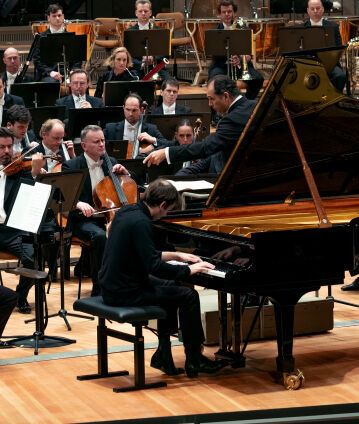Tugan Sokhiev with Shostakovich and Liszt

Dmitri Shostakovich was an admirer of Gustav Mahler. That is reflected in his Fourth Symphony, which recalls Mahler’s musical idiom with its dance and march motifs and its inner turmoil. At the same time, Shostakovich grapples with Stalin’s dictatorship. Tugan Sokhiev pairs the Fourth Symphony with Franz Liszt’s Second Piano Concerto, a work full of expressive intensity. Alexandre Kantorow makes his debut as soloist with the Philharmoniker.
Alexandre Kantorow is acclaimed by the press as “Franz Liszt reborn”. He was the first Frenchman to win the gold medal at the prestigious Tchaikovsky Competition. Here, he makes his debut with the Berliner Philharmoniker alongside Tugan Sokhiev. “You can channel all kinds of emotions on the piano,” says the pianist. Liszt’s Second Piano Concerto, which the composer began in 1839 and only premiered some 20 years later, offers a dazzling palette for this. Liszt develops the entire work from a single musical idea introduced by the woodwinds at the very beginning – one of the composer’s favourite disciplines.
Dmitri Shostakovich’s Fourth Symphony also had to wait a long time for its premiere. To appease the Stalinist cultural functionaries in advance, the composer confessed in Pravda that with this work he was “responding to the ‘social mission’ of our remarkable epoch”. Shortly afterwards, however, the same newspaper condemned his opera Lady Macbeth as “muddle instead of music”. From one day to the next, Shostakovich became a political target. The rehearsals for the premiere of his Fourth Symphony were in full swing when the composer suddenly withdrew it. It is not known whether functionaries put pressure on him, or whether Shostakovich himself doubted that his public confession would pass the censor. Krzysztof Meyer, a friend of the composer, described the symphony as “one of Shostakovich’s most harrowing and tragic works”. It was not premiered until some 25 years after it was written – and after Stalin’s death.
© 2023 Berlin Phil Media GmbH
Related interviews
Artists
Our recommendations
- Tugan Sokhiev and Nikolai Lugansky
- Tugan Sokhiev and Yefim Bronfman perform Beethoven
- Tugan Sokhiev conducts music from “Swan Lake”
- A “Russian Evening” with Tugan Sokhiev and Vadim Gluzman
- Ravel’s Piano Concerto with Hélène Grimaud and Tugan Sokhiev
- Tugan Sokhiev conducts Prokofiev and Ravel at the Waldbühne